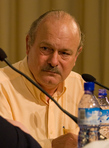post-postmodernism, anyone?
Went to a strange panel discussion at MIT yesterday – actually not a panel as I normally think of it – four short solo presentations, seriatim. It was called Present Past: Contemporary Art and the Uses of History. A fast hour and a half. Left me kind of dizzy.
To be fair, I'm no good at artspeak. It would be easy to parodize what the panelists said by presenting it out of context, but in fact there was not much time for context! So a lot of it just made this loud rushing noise as it went in one ear and out the other.
I liked what Matthew Buckingham said about the limits of realism, which I've said myself, less economically: "The only complete description of an object is the object itself." (Of course quantum physics introduces an uncertainty about that completeness, too.)
Jaleh Mansoor said that Seurat demanded to be paid by the hour (which the web verifies) – not surprising when you consider that his most famous work, Sunday Afternoon on the Island of La Grande Jatte, is made up of over three million individual dots of paint.
We got a laugh out of her showing Brancusi's famous portrait of James Joyce, printed in Finnegans Wake, a few vertical lines and a spiral. Googling, though, I find that he also drew a more realistic cartoon picture of Joyce with a few economical brush strokes, really capturing the man's curious mix of reserve and humor.
She also showed an ad for Crayola's Mess Free Color Wonder – a drawing medium that only works on the ground also sold by Crayola – which makes a kind of postmodern point just by existing. (Maybe "post-postmodern," a term two of the speakers used without any amplification. I guess I know what it means.)
A Vietnamese speaker, Danh Vo, was probably pretty interesting, but in between his accent and the room's echoing acoustics I could hardly follow him – a pity, because he showed slides of the Unabomber's typewriter and a newspaper clipping of George W. Bush's wedding to illustrate some abstruse point. I'd love to know what it was!
I also had a little trouble following Dieter Roelstraete, but I think he was quoting Nietzsche in his observation that we (presumably America) "inhabit an environment of studied cultures" rather than having one ourselves. Perhaps that's less true now than in Nietzsche's zeit. Should that be one word? My own impression is that American culture is almost always traceable to roots in British and European culture, with obvious exceptions from native American and island sources, and of course African, and with a distinctly American gloss or spin, not often an improvement. (And in the 21st century, what's American and what's global-industrial?)
As I said, most of it went over my head, but it was a lot of fun anyhow.
Joe
To be fair, I'm no good at artspeak. It would be easy to parodize what the panelists said by presenting it out of context, but in fact there was not much time for context! So a lot of it just made this loud rushing noise as it went in one ear and out the other.
I liked what Matthew Buckingham said about the limits of realism, which I've said myself, less economically: "The only complete description of an object is the object itself." (Of course quantum physics introduces an uncertainty about that completeness, too.)
Jaleh Mansoor said that Seurat demanded to be paid by the hour (which the web verifies) – not surprising when you consider that his most famous work, Sunday Afternoon on the Island of La Grande Jatte, is made up of over three million individual dots of paint.
We got a laugh out of her showing Brancusi's famous portrait of James Joyce, printed in Finnegans Wake, a few vertical lines and a spiral. Googling, though, I find that he also drew a more realistic cartoon picture of Joyce with a few economical brush strokes, really capturing the man's curious mix of reserve and humor.
She also showed an ad for Crayola's Mess Free Color Wonder – a drawing medium that only works on the ground also sold by Crayola – which makes a kind of postmodern point just by existing. (Maybe "post-postmodern," a term two of the speakers used without any amplification. I guess I know what it means.)
A Vietnamese speaker, Danh Vo, was probably pretty interesting, but in between his accent and the room's echoing acoustics I could hardly follow him – a pity, because he showed slides of the Unabomber's typewriter and a newspaper clipping of George W. Bush's wedding to illustrate some abstruse point. I'd love to know what it was!
I also had a little trouble following Dieter Roelstraete, but I think he was quoting Nietzsche in his observation that we (presumably America) "inhabit an environment of studied cultures" rather than having one ourselves. Perhaps that's less true now than in Nietzsche's zeit. Should that be one word? My own impression is that American culture is almost always traceable to roots in British and European culture, with obvious exceptions from native American and island sources, and of course African, and with a distinctly American gloss or spin, not often an improvement. (And in the 21st century, what's American and what's global-industrial?)
As I said, most of it went over my head, but it was a lot of fun anyhow.
Joe
Published on October 10, 2011 11:54
No comments have been added yet.
Joe Haldeman's Blog
- Joe Haldeman's profile
- 2191 followers
Joe Haldeman isn't a Goodreads Author
(yet),
but they
do have a blog,
so here are some recent posts imported from
their feed.



